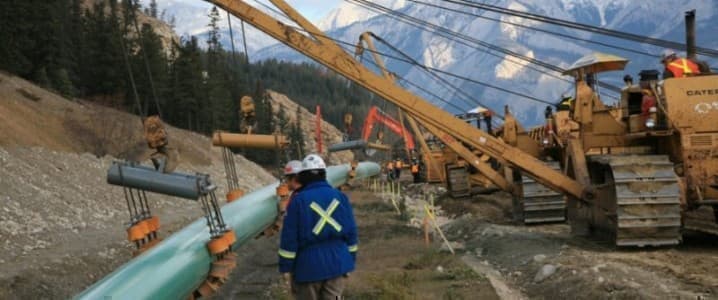When Kinder Morgan first announced its plans to expand the capacity of the Trans Mountain oil pipeline from 300,000 bpd to 890,000 bpd, it probably thought it was another major project.
Several years later, the company had given up on the project and sold it to the Canadian federal government for less than $4 billion. For a long time, it seemed like Trans Mountain would never be completed, plagued by opposition and regulatory snags.
Despite all this, it seems the pipeline is about to go into operation this year. And U.S. refiners used to cheap Canadian oil might need to reach deeper into their pockets to keep buying it.
The idea behind the Trans Mountain expansion was to turn Canada into a true oil exporter, reaching international markets rather than just the U.S. market, massive as it is. One reason this took so long was that the government of the province that was to host most of the pipeline was dead against it.
The John Horgan government was very environmentally minded. It would rather have Alberta stop all oil flows to British Columbia than endure the construction of the expanded Trans Mountain pipeline. That set back the project by months, and so did environmental protests against the pipeline. Related: Oil Prices Drop, Recover on Gaza War Ceasefire Proposal Rumors
Amid all this, the discount at which Canadian crude normally trades to WTI deepened and hardened. Canadian oil was going to the United States—all the way to the Gulf Coast—and only from there could it reach international markets. It was a complicated situation.
Then, when Kinder Morgan had enough and sold the project, the Trans Mountain expansion got a new lease of life—ironically, from a federal government that has made no secret of its distaste towards the oil industry. And it paid for that distaste. From an original $3.4-billion price tag, the Trans Mountain expansion bill swelled to over $23 billion.
Inflation and supply chain problems were among the reasons for the sixfold increase in the cost of the project, as were construction challenges due to the geology along the route of the pipe. Oil producers have not exactly welcomed the cost overruns—there were suspicions that to make up for these, Trans Mountain Corporation would charge them higher fees for carrying their crude.
Even so, producers began ramping up production in anticipation of the launch. Canadian Natural Resources said earlier this year that it would boost output in 2024 by 40,000 barrels of oil equivalent daily. Cenovus Energy announced plans to spend more on production growth as well. Oil producers are preparing for that 890,000 bpd in capacity.
Prices have responded, too. Following the news that Trans Mountain Corporation will start filling the expanded pipeline in February, with first crude to be loaded from Vancouver in April, Canadian crude prices jumped to the narrowest discount to WTI since August 2023. The current discount is about $16 per barrel.
This means that U.S. refiners used to cheap Canadian crude will need to start budgeting more for the commodity from this spring—assuming the project does not hit yet another snag. You never know, after in September the Canadian Energy Regulator gave TMC the go-ahead to change the route of the expanded pipe due to challenging terrain.
Just a month later, the same CER ordered TMC to stop work on the pipeline on the grounds of non-compliance with environmental and safety regulations. A month later, the regulator decided it could not allow TMC to go ahead with the route alternation after all because of opposition from the Indigenous community through whose land that section would pass. By December, however, the CER had changed its mind and granted TMC the permit it needed to continue work on the pipeline.
These sorts of setbacks made it really hard to believe the Trans Mountain pipeline will indeed see the light of day as an operating pipeline, but it seems it might happen after all. And that means more expensive oil for U.S. refiners. They’re about to encounter some international competition for Canadian crude.
By Irina Slav for Oilprice.com
More Top Reads From Oilprice.com:
- Fresh Sanctions Could Seriously Curtail Iran’s Surging Oil Exports
- Red Sea Crisis Tests China’s Sway in the Middle East
- GM Auto Dealers Call for More Hybrids As EV Market Stumbles



















It will prove a turning point for the Canadian ooil industry.
Dr Mamdouh G Salameh
International Oil Economist
Global Energy Expert
There was only ONE year that China bought more than one tanker (Aframax, partially loaded to pass through vancouvers shallow channels) and that was when the price crashed to $13/bbl due to overproduction. They bought eight aframax loads that year and that year only.